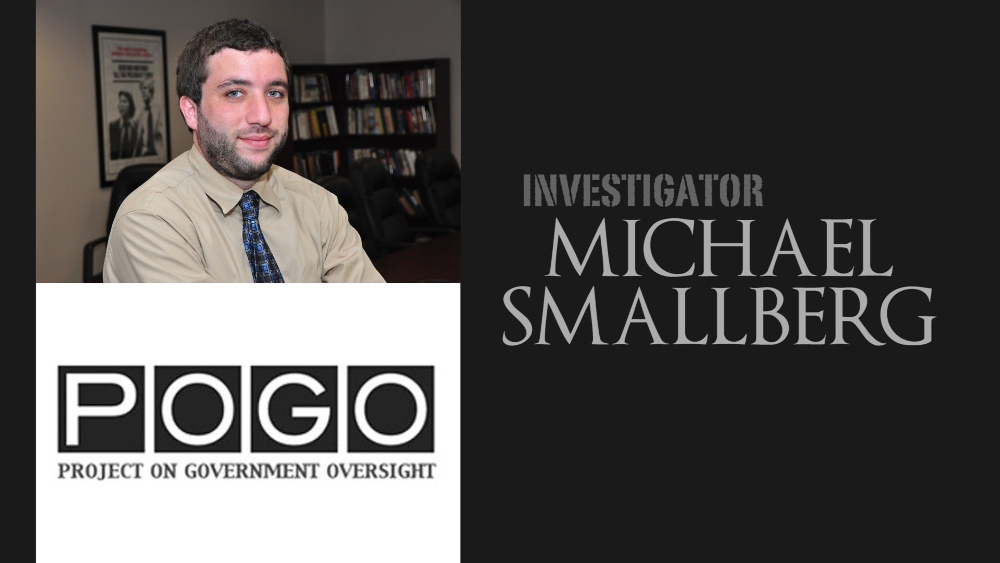Today I’ve posted part 3 of the transcript of my interview with Michael Smallberg of the Project on Government Oversight (POGO). POGO has released two reports over the past year or so regarding the Revolving Door problem at the SEC, where former SEC staffers take jobs in the private sector financial industry and use the knowledge they gained working at the SEC to help their new employers navigate around securities regulations.
Michael Smallberg: Its absolutely unfair that you have that kind of senior official constantly going through the revolving door to work for Wall Street and for the companies they used to oversee and I think that really sets the tone at the top when you have senior officials taking that kind of action, I think that really reverberates throughout the agency at a deeper cultural level. We were talking about David Kotz earlier, one of his investigations found that there was an enforcement official that was supposed to be investigating Allen Stanford’s Ponzi scheme; he then left the SEC and actually represented him himself. This gentleman was actually fined last month by the Department of Justice for violating conflict of interest rules. That’s an egregious example of a deeper kind of trend where you have everyone from enforcement directors down to rank and file staff attorneys who are just seeing their time at the SEC as part of a trajectory to making much more money working for Wall Street
Phil Cannella: When you go into the SEC, do they just open the door to you?
Michael Smallberg: No and this is one big problem at the SEC is that it’s often very difficult to get information because we have to go through the long process of filing freedom of information act requests.
Phil Cannella: Have you ever had the opportunity of interviewing the Inspector General of the SEC?
Michael Smallberg: We’ve spoken to him, yes. We didn’t get a chance to do the kind of interview you did, which is great and I think it really highlights some of the really important work he’s done. I think he did another audit which explained why it is often hard to get information about the SEC. He found that the SEC’s disclosure rate in response to these FOIA requests was one of the worst across all agencies of the federal government, and in fact, Congress, shortly after passing the Dodd-Frank act, actually repealed the provision that would have given the SEC sweeping, broad new powers to withhold even more information from the public, from groups like ours, from journalists that are trying to see what the SEC’s up to. So I think the issue with transparency is really key to making sure that not only the SEC but other agencies and Congress are doing their jobs and being held accountable.
Phil Cannella: I’d like to get your opinion on the SEC Inspector General H. David Kotz, and why he is leaving his post.
Michael Smallberg: We were surprised to see him leave at this time. He had just given an interview about a month before where he stated that he would be staying at the agency for a little longer so we were surprised to see him leave and disappointed given his strong track record. I guess you’d have to ask Mr. Kotz for the exact reasons why he’s leaving at this time but I will say he was speaking to the issue if he thought he might get fired if he ever got too close to the truth. I think one thing he was really effective at was maintaining a close relationship with Congress which is very important for IGs to do because they’re critical for providing Congress with the information they at least should be using to do a better job of overseeing the SEC. For example he had a great relationship with Senator Charles Grassley who’s been a long time critic of the SEC and a supporter of IGs and watchdogs within the agencies. I think if he had ever felt that there was some undue pressure he was getting at the agency level he was always very good at communicating that with Congress and making sure they were aware of those problems.
Phil Cannella: I’m going to switch gears for a moment. What do you think is the reason that the media isn’t reporting on safe investment alternatives outside of the securities industry?
Michael Smallberg: I do know that there were a lot of problems, at least with investors, having a false sense of security in some of the things they were investing in. I think sometimes part of the problem is when they would see that someone like the SEC or another group that we’ve taken a long look at, which is FINRA, which is the self-regulatory group for the securities industry…
…there have been times when you see that the SEC or FINRA has examined a company and hasn’t come across any wrongdoing when in fact, that company is able to mask some of the wrongdoing because they’re able to hire former officials from these agencies who at least can provide a façade that this company is on the up-and-up and will be offering a safe product for investors to put their money in. Sometimes I think it’s really important for folks to do their homework.
Phil Cannella: It’s always important to do your homework. In the thirty years of your nonprofit organization, has the government ever taken any of your suggestions and put them into action?
Michael Smallberg: Yes, for most of our history, we worked on was defense contracting issues and trying to get the Pentagon to stop wasting its money on outdated and expensive weapons programs that they no longer need. So for example, we were instrumental in getting Congress to cancel the F-22 fighter jet, which was massively over cost and was not needed anymore and was really costing taxpayers and the government money which it can’t afford right now.
Phil Cannella: The fact that your agency is generally going to pursue cases where you have a reasonably good chance of winning, does that mean that pursuing the systemic problem in Congress is out of the question for your organization?
Michael Smallberg: No of course not, we take that very seriously. Once a month we actually provide training to any Congressional staffers who want to come and learn how to do a better job of holding hearings and conducting oversight investigations because in our experience, we’ve notice a very sharp decline in both the quantity and the quality of Congressional investigations and hearings since the 1970s and going up to present day so we think were trying to get Congress to do a better job of investigating these things and its very important to see just that they’re not insider trading as well, and we’ll certainly take a look at that.
That’s all for today, but check back in for the final installment of the transcript of this fascinating interview.
Portions of this interview not pertaining to the main conversation have been edited to preserve the proper flow of ideas. For the full conversation, please refer to the audio recording, taken from the Crash Proof Retirement Show®






Pingback: A Transcript of Phil Cannella’s Interview with Michael Smallberg of POGO (Part 2)